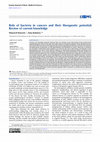Papers by Wojciech Wawręty

Role of bacteria in cancers and their therapeutic potential: Review of current knowledge, 2025
Cancers are extremely dynamic diseases that can actively cause refractoriness to be gained from a... more Cancers are extremely dynamic diseases that can actively cause refractoriness to be gained from applied therapies, which is why they are at the forefront of deaths worldwide. In this literature review, we covered the most recent and important discoveries regarding the influence of human microbiota, including tumor bacteriome, on the development and treatment of cancer. Advances in research on microbial communities have enabled us to discover the role of the human microbiome in the development and course of this disease, helping us understand neoplasms better and design new
potential therapies. As we show through our findings, by immunomodulation and the secretion of certain chemical substances, the correct bacteriome of the intestinal tract, respiratory system, or skin
can protect humans against cancer development and help during the treatment process. Bacteria also reside inside tumors, forming part of the tumor microenvironment (TME), where they interact with immunological and cancer cells in many complex ways. Some bacteria, such as Pseudomonas aeruginosa or Akkermansia muciniphila, can stimulate anticancer cell-mediated immune responses or even directly lead to cancer cell death. We also present the clinical possibilities of using some live, usually modified bacteria to develop bacteriotherapies. Modifying the gut microbiome to stimulate standard treatment is also important. Research on the microbiome and cancer remains a challenging
topic in microbiology, having a great potential for advancements in cancer therapy in the future, and is continuously becoming a more and more popular field of research, as shown by our statistical analysis of PubMed data.
Elektrownie gazowe i węglowe w kryzysie wodnym, 2024
Raport mapuje istniejące i planowane krajowe elektrownie konwencjonalne pod kątem lokalizacji na ... more Raport mapuje istniejące i planowane krajowe elektrownie konwencjonalne pod kątem lokalizacji na obszarach niedoborów wód. Ocenia także wodochłonność polskich elektrowni i identyfikuje elektrownie powodujące największy stres wodny (czyli takie, które naruszają minimalny poziom wody w rzece zapewniający w niej utrzymanie życia).
Books by Wojciech Wawręty
Atlantyda: Narodziny Legendy, 2020
Historia Atlantydy pasjonuje kolejne pokolenia od wieków, a zaginiona wyspa przez różnych badaczy... more Historia Atlantydy pasjonuje kolejne pokolenia od wieków, a zaginiona wyspa przez różnych badaczy była sytuowana praktycznie we wszystkich zakątkach ziemi. Ile historii znajduje się w tej opowieści? Czy opowieść o zniszczonej cywilizacji ma swoje źródła w archeologii? Czy wreszcie zrozumiemy, jak narodziła się legenda?

Uploads
Papers by Wojciech Wawręty
potential therapies. As we show through our findings, by immunomodulation and the secretion of certain chemical substances, the correct bacteriome of the intestinal tract, respiratory system, or skin
can protect humans against cancer development and help during the treatment process. Bacteria also reside inside tumors, forming part of the tumor microenvironment (TME), where they interact with immunological and cancer cells in many complex ways. Some bacteria, such as Pseudomonas aeruginosa or Akkermansia muciniphila, can stimulate anticancer cell-mediated immune responses or even directly lead to cancer cell death. We also present the clinical possibilities of using some live, usually modified bacteria to develop bacteriotherapies. Modifying the gut microbiome to stimulate standard treatment is also important. Research on the microbiome and cancer remains a challenging
topic in microbiology, having a great potential for advancements in cancer therapy in the future, and is continuously becoming a more and more popular field of research, as shown by our statistical analysis of PubMed data.
Books by Wojciech Wawręty
potential therapies. As we show through our findings, by immunomodulation and the secretion of certain chemical substances, the correct bacteriome of the intestinal tract, respiratory system, or skin
can protect humans against cancer development and help during the treatment process. Bacteria also reside inside tumors, forming part of the tumor microenvironment (TME), where they interact with immunological and cancer cells in many complex ways. Some bacteria, such as Pseudomonas aeruginosa or Akkermansia muciniphila, can stimulate anticancer cell-mediated immune responses or even directly lead to cancer cell death. We also present the clinical possibilities of using some live, usually modified bacteria to develop bacteriotherapies. Modifying the gut microbiome to stimulate standard treatment is also important. Research on the microbiome and cancer remains a challenging
topic in microbiology, having a great potential for advancements in cancer therapy in the future, and is continuously becoming a more and more popular field of research, as shown by our statistical analysis of PubMed data.